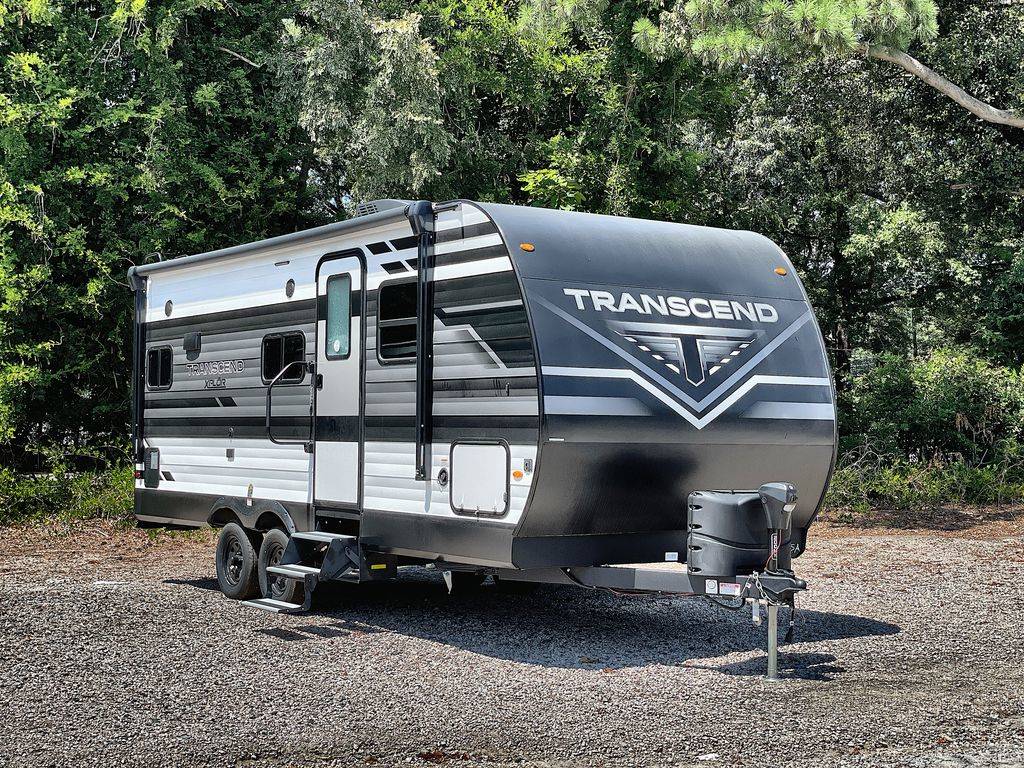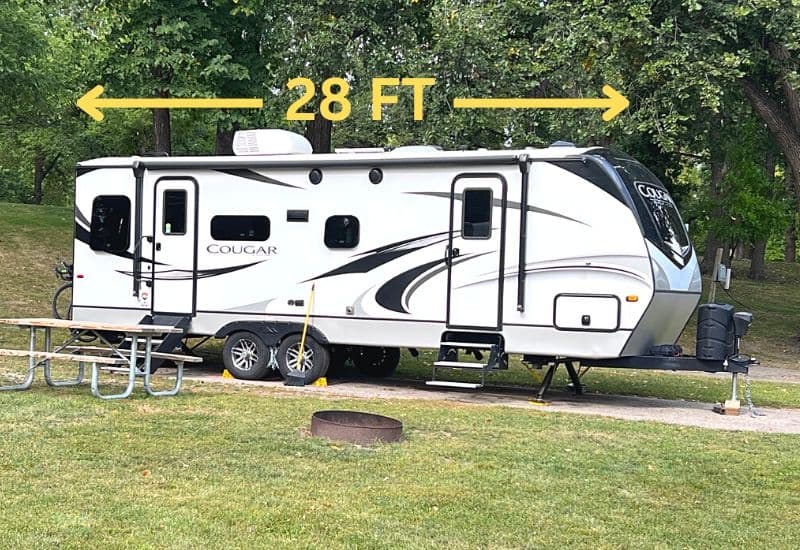Travel trailers come in various sizes, ranging from 13 to over 40 feet.
However, one of the most popular sizes is the 28-foot travel trailer, thanks to its perfect balance between the smallest and largest options.
As it provides plenty of space for features and amenities without being unmanageable.
If you’re considering towing a 28-foot travel trailer though, it’s important to know its weight to ensure your tow vehicle can safely handle it.
So, how much does a 28-foot travel trailer weigh?
Generally, a 28-foot travel trailer has a dry weight ranging from 5,000 to 6,500 pounds and a fully loaded weight of 5,500 to 7,000 pounds.
Depending on the trailer’s make and model, as well as the amount of cargo inside
If you’re interested in the specifics of the 28-foot travel trailer though, including its hitch weight, cargo carrying capacity, and gross vehicle weight rating, keep reading.
As we did a ton of research to find the weights of the most popular 28-foot travel trailers and then compiled this data into a comparison table for easy reference.
So you could easily compare one trailer’s weight to another.
28-Foot Travel Trailer Weights (Lightest to Heaviest)
| Make/Model/Trim | Length | Dry Weight | Hitch Weight | Cargo Capacity | GVWR |
|---|---|---|---|---|---|
| 1. Dutchmen Colorado 24BHC | 28′ 8″ | 4,739 lbs | 487 lbs | 2,861 lbs | 7,600 lbs |
| 2. KZ RV Sportsmen Select 260BHSL | 28′ 7″ | 4,760 lbs | 660 lbs | 2,240 lbs | 7,000 lbs |
| 3. Coachmen Summit Series 8 231MKS | 28′ 2″ | 5,101 lbs | 658 lbs | 1,599 lbs | 6,700 lbs |
| 4. Heartland Prowler 240SRB | 28′ 5″ | 5,160 lbs | 670 lbs | 2,478 lbs | 7,670 lbs |
| 5. CrossRoads Sunset Trail SS242BH | 28′ 11″ | 5,231 lbs | 646 lbs | 2,436 lbs | 7,667 lbs |
| 6. Jayco Jay Feather 24RL | 28′ 7″ | 5,305 lbs | 640 lbs | 1,445 lbs | 6,750 lbs |
| 7. Keystone Bullet 243BHSWE | 28′ 4″ | 5,422 lbs | 630 lbs | 1,078 lbs | 6,500 lbs |
| 8. Jayco Jay Flight 247RBS | 28′ 10″ | 5,480 lbs | 650 lbs | 1,270 lbs | 6,750 lbs |
| 9. KZ RV Sportsmen SE 241RKSE | 28′ 2″ | 5,500 lbs | 650 lbs | 1,500 lbs | 7,000 lbs |
| 10. Forest River Surveyor Legend 235FKLE | 28′ 8″ | 5,693 lbs | 750 lbs | 2,057 lbs | 7,750 lbs |
| 11. Grand Design Imagine 2400BH | 28′ 11″ | 5,725 lbs | 505 lbs | 2,125 lbs | 7,850 lbs |
| 12. Coachmen Northern Spirit 2455BH | 28′ 11″ | 5,728 lbs | 790 lbs | 1,872 lbs | 7,600 lbs |
| 13. Keystone Cougar Half-Ton 24SABWE | 28′ 4″ | 6,165 lbs | 640 lbs | 1,635 lbs | 7,800 lbs |
| 14. Forest River Salem 22ERAS | 28′ 2″ | 6,196 lbs | 685 lbs | 1,489 lbs | 7,685 lbs |
| 15. Airstream Globetrotter 27FB | 28′ 2″ | 6,300 lbs | 875 lbs | 1,300 lbs | 7,600 lbs |
Understanding Travel Trailer Weight
While some RV weights are self-explanatory, others are not so clear.
So let’s take a few minutes to explain all the different RV weights, as it’s important to understand the different weights associated with a travel trailer.
As these weights can have a substantial impact on towing as well as the type of vehicle needed to pull the camper.
There are five main trailer weights you should be familiar with, including dry weight, fully loaded weight, cargo carrying capacity, hitch weight, and gross vehicle weight rating.
Dry Weight (Unloaded Vehicle Weight)
Dry weight, also known as unloaded vehicle weight, is the weight of the trailer without any cargo or fluids.
Sometimes, it’s also referred to as factory weight, since it represents the trailer’s weight as it leaves the factory.
The dry weight on a travel trailer provides a great baseline for weight.
But it’s important to remember that this is just the starting weight of the trailer, which leads us to the fully loaded weight.
Fully Loaded Weight
Fully loaded weight is the combined weight of the trailer and everything inside it, including camping gear, personal belongings, propane, batteries, water, etc…
This is one of the most important RV weights to know, as it represents the travel trailer’s actual weight you’ll be towing.
Determining a camper’s loaded weight can be tricky though since it depends on how much you pack.
As some RVers are minimalist travelers while others bring everything.
Generally, though, you should plan on adding between 500 and 1,000 pounds of cargo weight to a 28-foot trailer, for a moderate load out.
This brings us to the topic of cargo-carrying capacity.
Cargo Carrying Capacity (Payload Capacity)
Cargo carrying capacity, or payload capacity, indicates the maximum weight of cargo a travel trailer can handle.
It’s imperative never to surpass this capacity, as it can stress the trailer’s axles, tires, and frame, which can compromise the camper’s stability, handling, and safety.
Hitch Weight
Hitch weight, or tongue weight, is the weight exerted on the hitch ball of the towing vehicle by the trailer.
Often overlooked, a trailer’s hitch weight is very important, as you never want to exceed the tow vehicle’s max hitch weight, as this can compromise the stability and safety of both the trailer and the tow vehicle.
Gross Vehicle Weight Rating
The gross vehicle weight rating (GVWR) is the highest allowable weight for the travel trailer, which includes both the trailer’s weight and its cargo.
RV manufacturers set the GVWR based on structural components of the trailer like the axles, suspension, and frame.
It’s important to never exceed the trailer’s gross vehicle weight rating, as this can lead to safety issues and potential damage to the trailer.
Factors that Affect the Weight of a 28-Foot Travel Trailer

Despite their similar lengths, 28-foot travel trailers can vary significantly in weight.
In fact, there can be as much as a 2,000-pound weight difference between the lightest and heaviest options.
Which can have a big impact on the type of tow vehicle you need to pull the camper. (More on this later.)
So for those trying to stay on the lighter side, we created this list, highlighting the biggest factors that affect the weight of a 28-foot trailer.
Construction and Building Materials
RV manufacturers use a wide range of construction techniques and materials to produce a travel trailer, which can have a significant impact on its weight.
For example, a trailer built using aluminum framing will always weigh less compared to one using traditional wood framing.
RV Slide-Outs
Another factor that can have a substantial impact on a trailer’s weight is the number of slide-outs it has, as even one slide-out can add 800 pounds to the weight of a trailer.
It’s not just the number of slide-outs though that can affect the weight of a travel trailer, as slide-out type also has an impact.
There are four main types of RV slide-outs, including electric, hydraulic, cable, and tip-out, which all have their own weight ranges.
Layout or Floorplan
Surprisingly, the layout or floor plan of a trailer can have a significant impact on weight.
A front kitchen layout, for instance, concentrates more weight at the front of the trailer, which can add considerable weight to the hitch.
Features and Amenities
The features and amenities of a trailer play a crucial role in determining its overall weight.
For example, a camper decked out in solid wood cabinetry, residential furniture, larger appliances, solid surface countertops, and dual ACs can add hundreds of pounds to the trailer.
Which is why luxury RVs always weigh more than their entry-level counterparts.
28-Foot Travel Trailer Weight Compared to Other Trailer Lengths
Generally, the longer a travel trailer is, the heavier it tends to be.
However, this broad observation isn’t particularly helpful when trying to determine the appropriate size travel trailer for your tow vehicle based on its towing capacity.
So to offer more detailed insight, we created the table below.
Which highlights the most popular trailer lengths alongside their respective weight ranges.
| Travel Trailer Length | Average Dry Weight |
|---|---|
| 18-Foot Travel Trailer | 2,000 – 3,000 lbs |
| 20-Foot Travel Trailer | 2,500 – 4,000 lbs |
| 22-Foot Travel Trailer | 3,000 – 4,500 lbs |
| 24-Foot Travel Trailer | 3,500 – 5,000 lbs |
| 26-Foot Travel Trailer | 4,500 – 6,000 lbs |
| 28-Foot Travel Trailer | 5,000 – 6,500 lbs |
| 30-Foot Travel Trailer | 5,500 – 7,000 lbs |
| 40-Foot Travel Trailer | 8,000 – 11,000 lbs |
Vehicles that Can Tow a 28 FT Travel Trailer

While 28-foot travel trailers aren’t the heaviest campers on the road, they’re certainly not the lightest either.
As trailers of this size generally have a fully loaded weight ranging from 5,500 to 7,000 pounds.
Because of this, less capable tow vehicles, such as compact and mid-size SUVs or small trucks will generally not be able to tow the camper.
However, if you’re in search of specific vehicles that can handle a 28-foot trailer, we’ve got you covered, as the list below highlights some of the most popular tow vehicles for a 28-foot travel trailer.
- Ford F-150 – 5,000 to 11,300 Pounds
- Dodge RAM 1500 – 6,180 to 8,330 Pounds
- Lincoln Navigator – 6,200 to 8,300 Pounds
- Dodge Durango – 6,200 to 8,700 Pounds
- Chevrolet Suburban – 7,400 to 7,800 Pounds
- Ford Ranger – 7,500 Pounds
- Cadillac Escalade – 7,500 to 7,700 Pounds
- GMC Yukon – 7,500 to 7,900 Pounds
- Chevrolet Tahoe – 7,600 to 7,900 Pounds
- Nissan Armada – 8,500 Pounds
- Chevrolet Silverado 1500 – 8,900 to 11,000 Pounds
- Nissan Titan – 9,053 to 9,323 Pounds
Recent Posts
Are you ready to hit the open road in your RV? Before you set off on your adventures, it's crucial to have the right RV travel tips and RV accessories up your sleeve. As a seasoned RVer, I've...
47 RV Storage Ideas to Maximize Your Space for Compact Living
Camping and living in an RV is an incredible adventure, but it comes with its fair share of challenges, particularly around storage, due to the lack of space. Because of this, it's a must to make...

